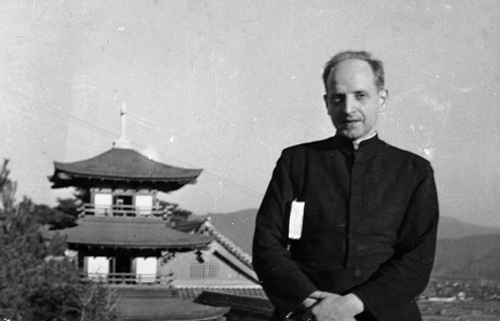Pedro Arrupe, soon after arriving in Japan.
The Diplomat. 06/08/2018
Today is the 73th anniversary of the explosion of the first atomic bomb in Hiroshima. Father Arrupe, who was the leader of Jesuits between 1965 and 1983, witnessed –being maybe the only Spanish- a catastrophe that put an end to the Second World War in the Pacific.
Born on 14 November 1907 in Bilbao, Pedro Arrupe left to be a missionary in Japan as Saint Francis Xavier, one of the founders of the Society of Jesus. He arrived in that Asian country in 1938 and he immediately started to learn the Japanese language and customs. On 8 December 1941, a few hours after Japan joined the battle, he was arrested and imprisoned by the local authorities under the accusation of being a spy. He was released a few weeks after and later, appointed novice master in Nagatsuka, a small locality seven kilometres away from what will later be the epicentre of the nuclear explosion in Hiroshima’s centre.
Arrupe wrote in a book –‘I lived the atomic bomb’– his experiences the day of the tragedy and the following months. On 6 August 1945, he was in a house with 35 young people and several Jesuit fathers, when, at 8:15 hrs, he saw “a very powerful light, like a magnesium explosion, shot before our eyes”.
When we opened the door of the room facing Hiroshima, “we heard a huge explosion, similar to the roar of a terrible hurricane, which took doors, windows, glasses, unstable walls…, that broke to pieces and fell over our heads”. These were three or four seconds “that seemed to be lethal”, although all those present there saved their lives. However, there was no trace of a bomb exploding there.
[hr style=»single»]
“We were going round the rice fields around our house to find the bomb’s place, when, fifteen minutes later, we saw that a thick smoke was rising in the city area and we could clearly see big flames. We went up a hill to see better and we could distinguish the place where the city used to be, because what we had in front of us was a completely devastated Hiroshima”, Arrupe narrates.
“A huge lake of fire” spread in front of them, which minutes later “blew Hiroshima to smithereens”. Those escaping the city did it “with difficulty, without running, as they would have wanted to escape that hell as soon as possible, because they could not do it due to the awful wounds they had”.
Arrupe, who had studied medicine, and the rest of Jesuits, improvised a hospital in the novitiate’s house. They were able to take more than 150 injured people and save almost all of them, although most of them suffered devastating effects of the atomic radiation in the human being. More than 70,000 people died the day the bomb exploded in Hiroshima and 200,000 more were hurt. At the end of 1945, the number of deaths had amounted to 166,000 people.







